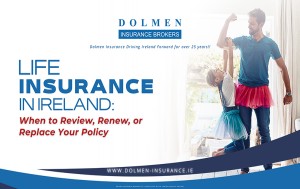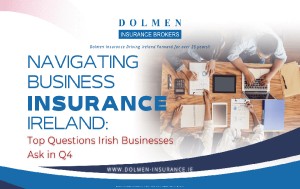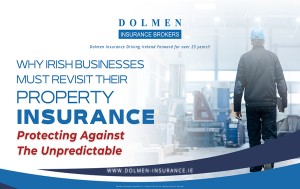
Running a restaurant in Ireland today is both rewarding and challenging. From rising operational costs to evolving legal requirements, the hospitality sector faces numerous hurdles. One critical aspect that can safeguard your business against unforeseen events is having the right restaurant insurance policy. According to a report by Ronan Smith in the Irish examiner over 200 restaurants closed in 2024 alone, resulting in an estimated €288 million loss to the economy, it's evident that proper insurance coverage is not just a safety net, it's a necessity.
At Dolmen Insurance, we've collaborated closely with the Restaurants Association of Ireland (RAI) to understand and address the unique challenges faced by restaurateurs. Through our partnership with restaurantInsurance.ie, we've introduced new policies in May 2025 that offer comprehensive coverage tailored to the hospitality sector's needs, all without increasing costs. As Darren Lundy from Restaurant Insurance and Dolmen Insurance recently highlighted, these policies are designed to provide the protection the industry requires in these uncertain times.
Key Factors in Choosing Restaurant Insurance
Selecting the right insurance policy involves more than just comparing premiums. Here are essential factors to consider:
1. Comprehensive Coverage
Ensure your policy covers a broad range of potential risks, including:
- Property Damage: Protection against fire, flood, or vandalism.
- Public Liability: Coverage if a customer suffers an injury on your premises.
- Employers' Liability: Mandatory in Ireland, this covers employee injuries or illnesses related to work.
- Business Interruption: Compensation for lost income during unforeseen closures.
- Equipment Breakdown: Coverage for essential kitchen equipment failures.
2. Tailored Policies
Every restaurant is unique. Whether you run a café in Galway or a fine-dining establishment in Dublin, your insurance needs will differ. Look for insurers that offer customisable policies to match your specific requirements.
3. Risk Management Support
Insurers that provide risk assessment services can help identify potential hazards in your operations, offering solutions to mitigate them. This proactive approach not only enhances safety but can also lead to reduced premiums.
4. Claims Handling Reputation
In the event of a claim, you want an insurer known for efficient and fair processing. Research customer reviews and ask for testimonials to gauge an insurer's claims handling track record.
Comparing Restaurant Insurance Policies
When evaluating different insurance options, consider the following:
1. Premium Costs vs. Coverage
A lower premium might be enticing, but it's crucial to ensure it doesn't come at the expense of essential coverage. Balance affordability with comprehensive protection.
2. Policy Exclusions
Understand what's not covered. Some policies might exclude specific events or have limitations on certain claims. Being aware of these can prevent unpleasant surprises later.
3. Deductibles and Excesses
Determine the amount you'll need to pay out-of-pocket before the insurance kicks in. Higher deductibles can lower premiums but may not be ideal if cash flow is tight.
4. Additional Benefits
Some insurers offer added perks, such as legal advice, health and safety consultations, or training resources. These can provide added value beyond the basic policy.
Tips for Finding Affordable Restaurant Insurance
Securing cost-effective insurance doesn't mean compromising on coverage. Here are strategies to achieve both:
1. Engage with Specialised Brokers
Working with brokers like Dolmen Insurance, who understand the hospitality sector, can provide access to tailored policies and competitive rates. Their expertise ensures you get coverage that aligns with your specific needs.
2. Implement Robust Safety Measures
Investing in safety protocols, such as fire suppression systems or staff training, can reduce the risk of incidents. Insurers often reward such proactive measures with lower premiums.
3. Regularly Review and Update Policies
As your business evolves, so do your insurance needs. Regularly reviewing your policy ensures it remains aligned with your operations, preventing over-insurance or gaps in coverage.
4. Bundle Policies
Combining multiple insurance needs, like property and liability, under one policy can lead to discounts and simplified management.
5. Maintain a Clean Claims History
A track record of few or no claims can position your business as low-risk, leading to more favourable premium rates.
Benefits of the Right Restaurant Insurance
Choosing the right restaurant insurance policy does far more than just tick a legal box, it safeguards the financial health, reputation, and operational continuity of your business. In Ireland, where the hospitality sector has faced immense pressure from rising costs and operational risks, having comprehensive insurance is critical. Recognising this, Dolmen Insurance, through its specialist division Restaurant Insurance, has forged a strong partnership with the Restaurants Association of Ireland (RAI). This close working relationship has proven invaluable in tailoring insurance solutions that meet the real-world needs of restaurateurs across the country. By actively listening to member feedback and analysing claims trends, Restaurant Insurance and the RAI have collaborated to drive down the cost of premiums while significantly increasing the cover benefits available to policyholders. The result is a set of insurance offerings introduced in 2025 reflect the realities of today’s hospitality industry, robust protection without the financial strain. Restaurateurs can now access policies that provide enhanced cover for public liability, business interruption, equipment breakdown, and more, all customised for the dynamic risks in the food service industry. With the right insurance in place, business owners can move forward confidently, knowing their restaurant is protected by policies shaped in partnership with the industry itself.
Having the appropriate insurance policy offers numerous advantages:
1. Financial Protection
In the face of unexpected events, insurance provides a safety net, covering costs that could otherwise jeopardize your business's viability.
2. Legal Compliance
Certain insurances, like employers' liability, are legally mandated in Ireland. Ensuring compliance avoids potential legal repercussions and fines.
3. Peace of Mind
Knowing you're protected allows you to focus on delivering exceptional service to your customers, without constant worry about potential risks.
4. Enhanced Reputation
Demonstrating a commitment to safety and responsibility can bolster your establishment's reputation among customers and within the industry.
5. Support During Crises
In challenging times, such as the recent spate of restaurant closures, having robust insurance can be the difference between recovery and permanent shutdown.
You own a Restaurant, Café or Gastro Pub, What next?
In conclusion, choosing the right restaurant insurance policy in Ireland requires careful consideration of your specific needs, potential risks, and the evolving landscape of the hospitality sector. By partnering with experienced brokers like Dolmen Insurance and leveraging resources like RestaurantInsurance.ie, you can secure comprehensive coverage that offers both protection and peace of mind. As the industry continues to navigate challenges, being adequately insured ensures your establishment remains resilient and poised for success.
For personalised advice and to explore the latest policies tailored for the hospitality sector, contact Dolmen Insurance today. Our team is dedicated to supporting Ireland's vibrant restaurant community, ensuring you have the coverage you need without unnecessary costs.
If you are looking for affordable, comprehensive insurance cover, consider Dolmen Insurance. Get in touch today to discuss all your insurance options and explore the benefits of working with Dolmen Insurance.
Whether it's Commercial Insurance, Mortgage Protection to Life Insurance , home insurance or car insurance we have you covered.
Contact Us Today.
Note: The information provided in this article is for general guidance purposes only and does not constitute professional advice. For personalised insurance recommendations, please consult with our qualified insurance advisor.





